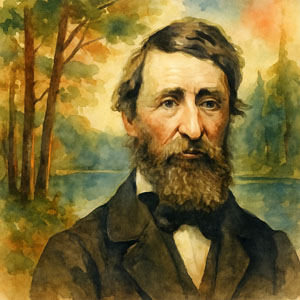— Henry David Thoreau

American writer and transcendentalist Henry David Thoreau (1817–1862) was born in Concord, Massachusetts. On July 4, 1845, he moved to Walden Pond “to live deliberately,” where he kept a reflective journal, wrote poetry, chopped wood, meditated, and listened to the language of the woods.
“We must learn to reawaken and keep ourselves awake, not by mechanical aid, but by an infinite expectation of the dawn,” he wrote. Over a lifetime of walking and wondering, his journals grew to nearly two million words.
Thoreau championed the human spirit. By connecting with nature, he discovered that life could be a celebration of hopes and dreams. “The world is but a canvas to our imaginations,” he mused… a reminder to see with fresh eyes and live with purpose.
His friend Ralph Waldo Emerson observed that Thoreau “chose to be rich by making his wants few, and supplying them himself… Every fact lay in glory in his mind, a type of the order and beauty of the whole.”
An individualist and a trailblazer, he invited us to march to our own inner rhythm: “If a man does not keep pace with his companions, perhaps it is because he hears a different drummer. Let him step to the music which he hears, however measured or far away.”

